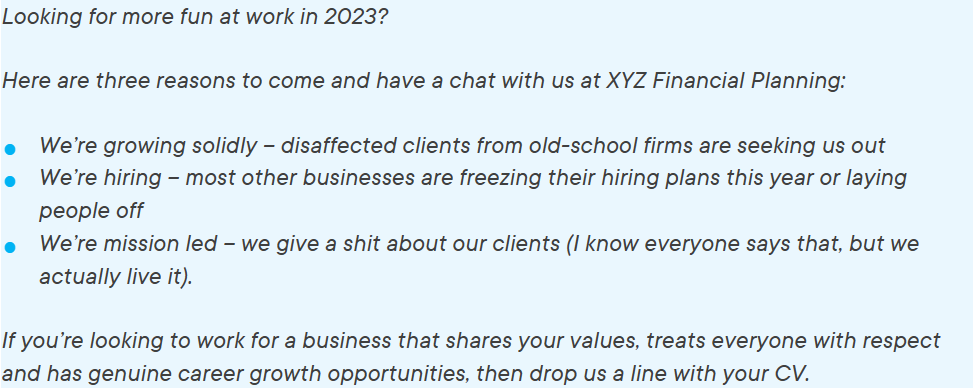2022 brought its share of challenges, although anecdotally, most financial planning firms still did pretty well.
What about this year? What are the big issues on which you’ll need to focus to continue or improve the trajectory you’re on?
Here are five major themes that I believe firms will be dealing with in some way shape or form in 2023:
1. Hiring might ease a smidge (be ready)
I’m now straying into the realms of economic forecasting which I realise is risky, but I’m going there regardless.
2022 was the tightest employment market I’ve ever seen in my life.
2023 is bound to start off the same way, but I would be planning for some hiring opportunities to develop as the year progresses.
The Bank of England cheered us all up late last year with their prediction of 2 years of recession coming our way. Whilst that’s bad for society in general, I believe it will be good for financial planning firms, who will actually do well out of the slowdown.
The key will be to get on the front foot with your recruitment plans and be promoting your good news story in a generally bad news world.
What is your good news story?
Something like this:

2. Specialisation gains real traction
Generalist financial planning firms are doing quite well.
Firms that can communicate who they work best with (i.e. specialists) are doing a lot better.
No one wants to go to a generalist. Generalists are scary.
US financial journalist Bob Veres prefers the word ‘specialisation’ over the word ‘niche’. I suspect many advisers do too, although let’s get over ourselves and understand they mean the same thing.
Specialisation means setting out your stall with an area or two in which you have real knowledge and expertise.
I feel like 2023 is the year when more and more of the leading financial planning firms get comfortable owning a space, rather than getting lost in the sea of sameness that is the general adviser marketplace.
Check out this blog from 2018, How To Reach Your Maximum Audience (yes I’ve been banging this drum for a while now).
Specialist advisory firms can attract clients from across the country, not just within a 20-mile radius of their office because they can engage with and service clients over Zoom. We’ve got the Covid pandemic to thank for that (a small silver lining in an otherwise crappy experience).
Think also about whether your staff might want to focus on areas that particularly affect your clients. Your technical staff/paraplanners might welcome being given the opportunity to really get into the details of a subject.
3. Financial planners do well in 2023 – the rest don’t
I wrote about this idea in October of 2022 so I won’t repeat myself, but Financial Planning Firms Grow Best In Tough Times.
The corollary is that firms that have not adopted the mindset, approach and business structure of the financial planning model will struggle.
My question to some of those firms is when will you learn? They suffered badly in the early stages of the pandemic too.
Here are two reasons why:
- They have self-employed advisers being paid 50% – 60% (or more) of all revenue they generate. The maths don’t work.
- The business has around 60% recurring revenue (financial planning firms have 80%-90%). So when investment markets fall, their recurring revenue becomes 40% of total revenue, new business goes quiet and they have to start laying people off.
For those firms, it’s time to re-think the business model.
4. More consolidators hit problems
As I wrote about in my end-of-year blog, Observations From 2022, due to the end of cheap money “all those VC and private equity firms investing in the financial services consolidation space might just be fiddling with their spreadsheets”.
There are two implications for 2023:
- Firstly, any advisers who have sold within the last couple of years and are still waiting to be paid the balance of their buyout might be getting nervous about receiving what they were promised.
- And secondly, plans to on-sell or float some of these consolidated groups may well be pushed back even further or canned indefinitely (and some of them have been waiting a long time already).
That probably won’t stop large sections of the adviser marketplace from falling all over themselves to sell their businesses.
I can only urge caution. You only do this once in your life. The buyers are doing it all day every day. Caveat venditor folks.
5. Well-managed firms take advantage
As a result of these first four themes, and because well-managed financial planning firms have probably already identified them to some extent, they will be able to grow and scale even faster as we end 2023 and head into 2024.
And I don’t mean solely by acquiring, although that may well be part of the story because solid financial planning firms make great buyers of your businesses.
By re-shaping their own businesses to take advantage of these themes, well-managed firms will be able to thrive while everyone else is flapping and trying to merely survive (or get out).
That’s got to make you feel good if you run a financial planning business.
What will you do?
2023 is going to offer opportunity mixed with difficulty.
Are you up for the challenge? Check out my blog from December 2022, Can You Embrace The Struggle for a reminder of why difficult times are a blessing, not a curse.
Let me know how you go.

